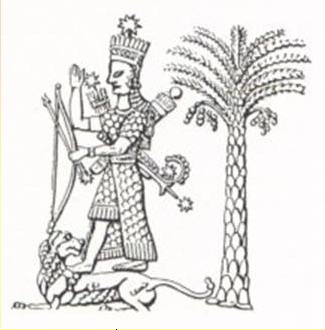

Linguistic note: In Sumerian myths the land of Dilmun (probably the original conception of paradise called by the Hebrews the Garden of Eden) was the place where the sun rises -- thus I surmise dil- may mean east.
Description: Warrior aspect of Ishtar as astral Goddess of dawn and the desert; She who opens the portals of heaven in Her supremacy; She who each morning, arrayed in Her armor, drives forth in Her lion-drawn chariot to hunt down animals and people.
To Whom are sacred: perhaps ibex (a horned beast, probably the ibex, was sacred to Athtar); lioness; the number 7 (seven lions draw Her chariot); chariot; the planet Venus (the association of the Goddess with war may arise from the association of the luminous presence of the morning star with the raiders who struck at dawn.)
Titles, Variants, etc.
Sources: Monaghan BGH 154; MEM/32-2, 114; NEM.JG/25, 118; Walker WEMS 457.
Geography/Culture: Babylonian-Semitic.
Description: Warrior aspect of Ishtar, the fierce and fearless virgin perfect in courage; Goddess of the daylight sky, [battles of life] and human warfare; She who nerves soldiers in the field and destroys their enemies; She who directs conquered kings through dream-oracles.
To Whom are sacred: bow and arrows; scimitar.
Titles, Variants, etc.
Sources: Monaghan BGH 5; NEM.JG/24, 87.
Linguistic note: a Semitic name for the planet Venus. Title of Ishtar, qv.